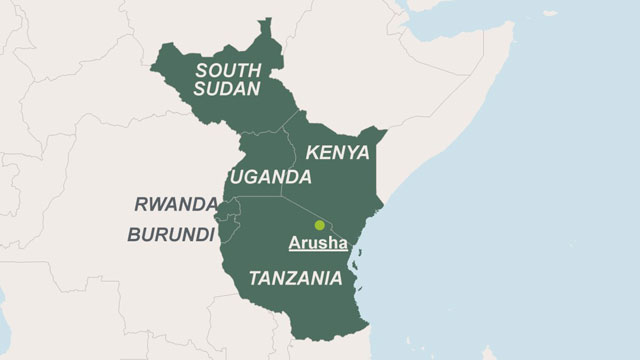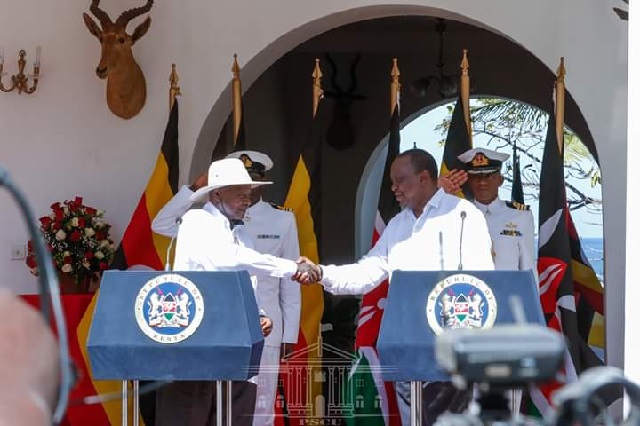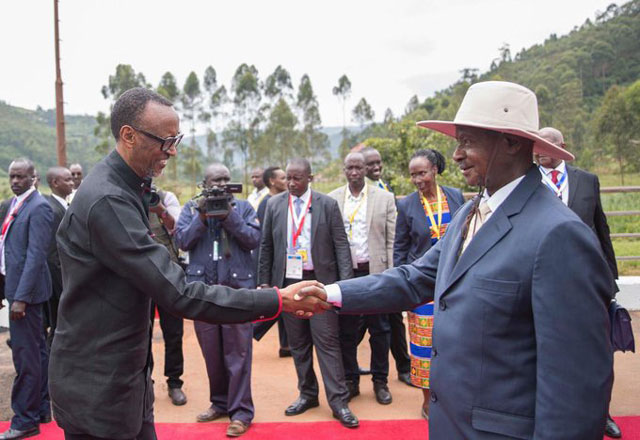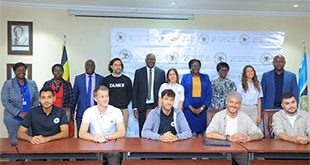
Kampala Uganda | THE INDEPENDENT | The East African Community’s 21st Heads of States Summit, which saw Kenya take over the chairmanship of the community, was unique in many ways, including being the first to be held virtually.
It also came at a time, when two of the members of the community, Uganda and Rwanda, could not trade with each other after the closure of the border.
The conflict climaxed when Rwanda accused Uganda of arbitrary detention and deportation of her citizens and giving support to nationals as opposed to the Kigali government. Uganda denied the accusations and says those affected were common criminals, with some involving in subversive activities, while others had entered the country illegally.
Last year several Rwandans and at least two Ugandans were fatally shot by Rwandan forces accusing them of the cross the border illegally. Calls to resolve the standoff under the EAC mechanisms were futile, mainly because one of the parties to the standoff was chairing the community.
For more than a year since Angola and the Democratic Republic of Congo (DRC) intervened, there is no solution in sight to-date.
Another conflict had seen Burundi, withdraw from attendance of summits, due to disagreements with Rwanda, the chair of the community over the two years.
In 2015, there was an attempted coup in Burundi as then the late President Pierre Nkurunziza was attending a summit in Tanzania, and Bujumbura accused Rwanda of involvement.

Burundi blocked food imports from Rwanda in 2019 and bus transport between the two were suspended. It is hoped that the current President Everisite Ndayishimye, who attended the just-concluded summit, will help normalize relations with neighbours and the EAC as a whole, as he promised.
Some analysts say the region suffers cases of seniority complexes, with some leaders considering their opinion on regional affairs superior to others, which affects the faith or motive with which they come for talks.
Uganda’s President Yoweri Museveni, the oldest of the six, is also the longest-serving followed by Kagame. He also led the revival of the community together with the late Benjamin Mkapa of Tanzania and the late Daniel Arap Moi of Kenya.
Kenya President, Uhuru Kenyatta openly bestows respect on President Museveni and they two usually hold friendly talks, but whether this will translate into an amicable solution towards the differences, remains a question.
Interstate relations at lowest
Arguably, generally, the inter-state relations in the community have been at their lowest over the last two years, when Kagame of Rwanda was chairman, with Liberate Mfumukeko from Burundi, as Secretary-General.
Apart from Rwanda, Uganda has seen its exports severally blocked by Tanzania and Kenya, with the two claiming that Uganda re-exports goods imported from other regions and that they should not be treated as Ugandan products.

Fact-finding missions have proved that the products, especially milk, beef, poultry and poultry products, as well as sugar, are produced in Uganda and do not violate rules of origin as usually claimed. But the crackdown on the exports continues.
Some Ugandan manufacturers have urged the government to institute retaliatory measures against especially Kenya for blocking Ugandan exports “without a proper explanation.”
Bilateral talks by the countries have not yielded a lasting solution.
Ugandans and the leadership, in particular, will be keen to see how Kenya, which is accused of unfair trade practices against Uganda, handles the situation as chair of the community.
Kenya and Tanzania have not had smooth relations either. In 2018, Tanzania burnt more than 10,000 chicks claiming that they had been illegally imported from Kenya. This is one of the recent incidents between the two countries, another one being the ban of Kenyan flights into Tanzania over a different approach to controlling the Covid-19 pandemic.
Tanzania also slapped a 25% import duty on bakeries and confectioneries from Kenya claiming that Kenya had used zero-rated industrial sugar imports to produce them.
The inter-country relations involving Uganda, Kenya and Tanzania are largely traced back to 2016 when newly elected president John Pombe Magufuli managed to win Uganda’s heart, forcing the East African Crude Oil Pipeline route diversion to Tanzania.
Following the decision, Kenya launched a race to be East African first crude oil exporter, dubbed Early Oil Pilot Scheme (EOPS), to export crude by road.
The project was abandoned by Tullow after one shipment of 240,000 barrels. Uganda’s oil production awaits construction of the export pipeline that could be completed in 2024, according to the two governments and oil company, Total E&P.
The race for regional supremacy also included Kenya and Tanzania using incentives in the fight for importers from Uganda and other landlocked countries to trade through either Mombasa or Dar-es-Salaam ports.
Since he took over in 2015, President Magufuli has taken a more protectionist approach to regional integration than his predecessors, and instead preferring a bilateral approached to projects. The heads of state at the 21st summit concluded on Saturday, pledged commitment to the progress of the region.
Outgoing Chairman Kagame declined to speak at the public session, saying he had already made his points at the closed session, only saying that the last year was one like none before due to the effects of Covid 19.
Magufuli in a speech read by his Vice President Samia Hassan Suluhu called for the fast removal of the remaining non-tariff barriers within the region.
“The government on Tanzania is committed to implementing a blueprint for regulatory reforms to improve business and development,” he said.
Museveni told his colleagues that unless the partner states abide by the rules of the integration process as laid out in the treaties, the objectives will not be met. He warned about the continued disruption of the markets through the NTBs and other barriers.
“If you produce a good or a service, and you don’t get enough market for it, you will not continue, we have seen some parts of the world like for instance Latin America, Latin America is a very reach part of the world.
But because it is organized in a fragmented way, you can see what is happening there,” he said.
Ndayishimye pledged that Burundi will be committed going forwards, to supporting the implementation of the EAC’s programs.
Kenyatta will also have to spearhead programs and steps that will see the partner states remit their contributions on time.
Burundi and South Sudan are the most highly indebted, being the most financially distressed economies.
The year 2020 also ended with the EAC accumulating arrear, especially in emoluments to secretariat staff and legislators.
********
URN
 The Independent Uganda: You get the Truth we Pay the Price
The Independent Uganda: You get the Truth we Pay the Price

